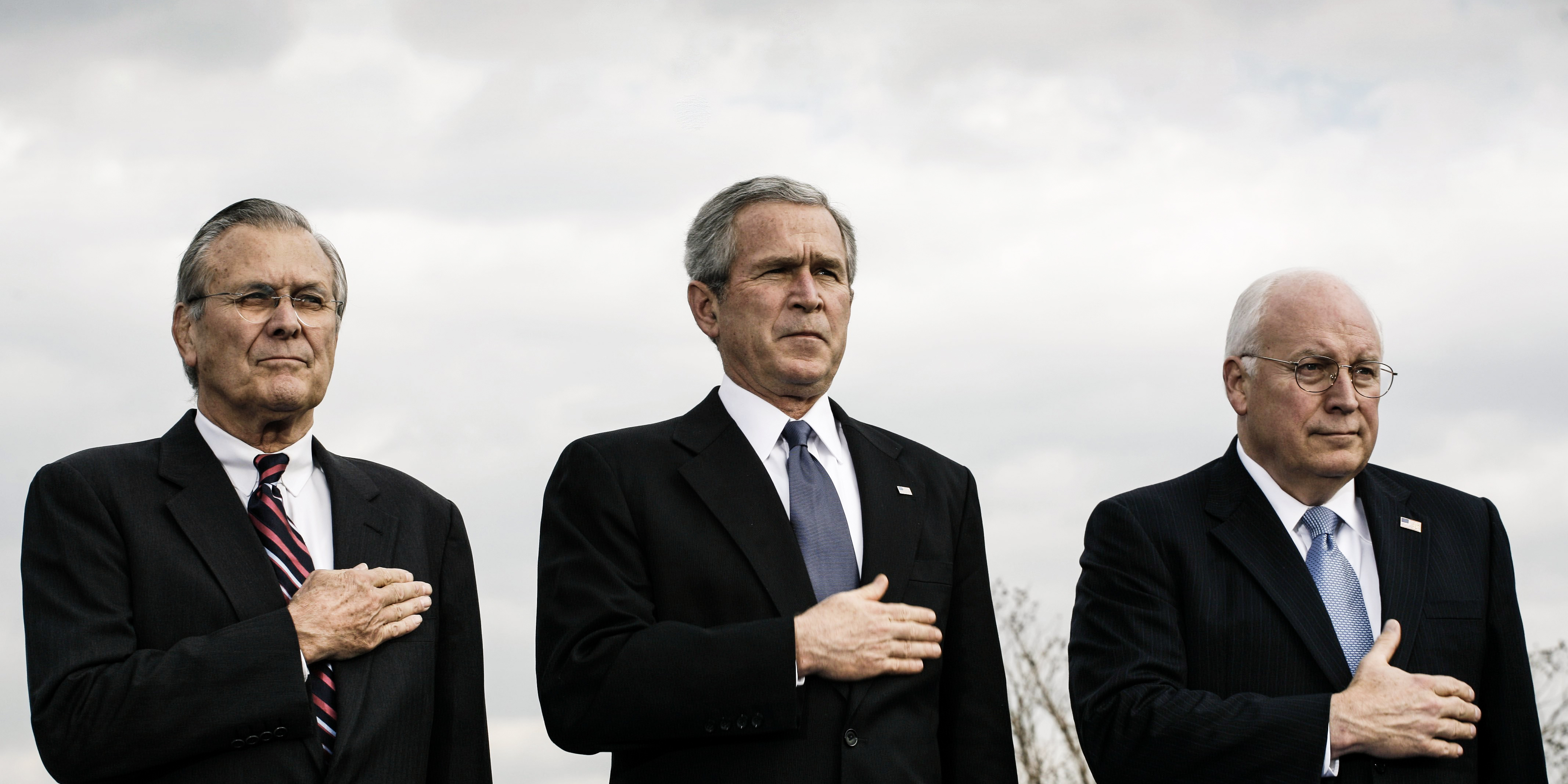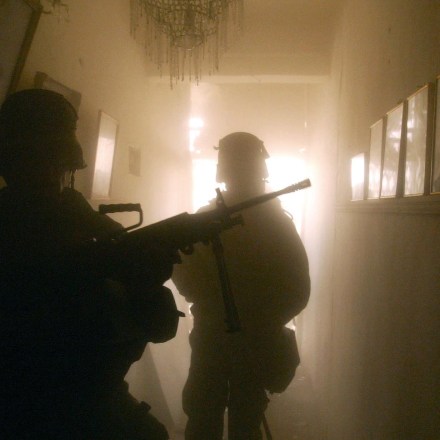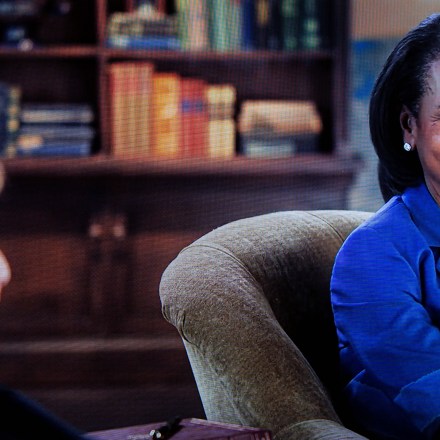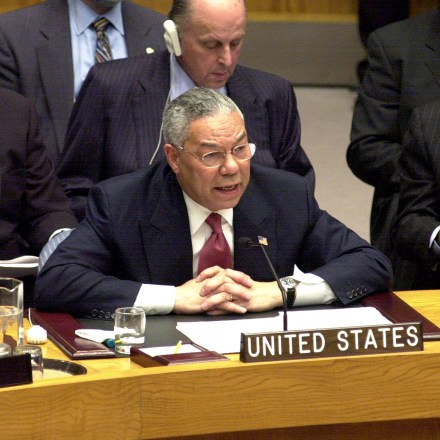The U.S. and its allies invaded Iraq 20 years ago in Operation Iraqi Freedom. President George W. Bush’s press secretary Ari Fleischer twice accidentally referred to it as Operation Iraqi Liberation, which was definitely not its official name and would have generated an unfortunate acronym.
The men and women who launched this catastrophic, criminal war have paid no price over the past two decades. On the contrary, they’ve been showered with promotions and cash. There are two ways to look at this.
One is that their job was to make the right decisions for America (politicians) and to tell the truth (journalists). This would mean that since then, the system has malfunctioned over and over again, accidentally promoting people who are blatantly incompetent failures.
Another way to look at it is that their job was to start a war that would extend the U.S. empire and be extremely profitable for the U.S. defense establishment and oil industry, with no regard for what’s best for America or telling the truth. This would mean that they were extremely competent, and the system has not been making hundreds of terrible mistakes, but rather has done exactly the right thing by promoting them.
You can read this and then decide for yourself which perspective makes the most sense.
The following list doesn’t include anything about the Iraqis who’ve died since 2003. Partly, this is because it’s traditional for the U.S. media to pay no attention to the lives of foreigners. Partly, this is because we have no idea how many Iraqis deaths there have been. Various estimates range from 151,000 to over a million. While the U.S. ultimately spent at least $3 trillion on the war and the CIA put down $1 billion just to figure out that Iraq had no weapons of mass destruction, we’ve allocated exactly zero dollars to learn how many Iraqis have died thanks to us. Come on, we’re not made of money!
George W. Bush
Former president Bush and Russian President Vladimir Putin are the 21st century’s premier war criminals. In a better world, they’d be sharing a cell at The Hague, playing lots of pinochle and getting up to various mass murderer hijinks.
But here in this universe, Bush is gobbling down huge quantities of money on the speaking circuit, where he charges at least $100,000 for an hour of his pensées. He recently condemned “the decision of one man to launch a wholly unjustified and brutal invasion of Iraq.” Then he said, “I mean, of Ukraine!” and he and his audience all chortled, because you have to admit that’s pretty funny.
His time is also devoted to painting and being buddies with the Clintons and the Obamas. In particular, he likes to sneak candy to Michelle Obama at solemn events.
“I mean, of Ukraine!” Ha ha ha ha ha, what a scamp.
Dick Cheney
Vice President Cheney told one of the most blatant lies about Iraq during the buildup to the war. In an August 2002 speech, he claimed that when Saddam Hussein’s son-in-law Hussein Kamel defected in 1995, he revealed that Iraq was trying to make nuclear weapons again. In reality, Kamel had insisted that Iraq had no unconventional weapons of any kind. This was not a big secret: Kamel said it on CNN in an interview that was available to anyone with an internet connection. America’s crack press corps ripped the lid off Cheney’s obvious deceit by completely missing it.
Since leaving office, Cheney has spent his time fishing, endorsing Donald Trump for president in 2016, and not being prosecuted for torture. Also, for a period of time, he had a kind of external mechanical heart that pushed blood through his veins continuously, meaning that he had no heartbeat yet was still alive (?).
Donald Rumsfeld
On the afternoon of 9/11, as the Pentagon was still on fire, Secretary of Defense Rumsfeld was eagerly asking whether the U.S. could now attack Iraq.
Rumsfeld died in 2021, but before then, he got in some quality time at his antebellum vacation home on the Chesapeake Bay in Maryland. The nickname of Rumsfeld’s estate was Mount Misery. As the New York Times reported, it had once been owned by a man named Edward Covey, who was “notorious for breaking unruly slaves for other farmers.” One subjected to this treatment was a 16-year-old Frederick Douglass, who later wrote it made him “wrecked, changed, and bewildered; goaded almost to madness.”
You have to admit there’s a nice historical symmetry here, given Rumsfeld’s own role in tormenting other humans. You can imagine Covey’s ghost visiting Rumsfeld in the darkest night and telling him, “Hey — great job.”
Colin Powell
One neat thing about Secretary of State Powell’s 2003 presentation at the United Nations was that Powell absolutely knew he was lying. Famed Washington Post columnist Mary McGrory responded to Powell’s deluge of deception by proclaiming, “He persuaded me, and I was as tough as France to convince. … The cumulative effect was stunning.” McGrory apparently did not know the most basic fact about Powell, which was that he was an extremely proficient liar who’d risen to the top by lying about the My Lai massacre in Vietnam and then lying about the Iran-Contra scandal.
Powell also died in 2021, but before that, he spent his post-political life being rich. Every now and then, people would ask him about his U.N. appearance, and he would tell them he had been horribly misled by individuals he never identified.
John Bolton
Under Secretary of State Bolton played a central role in the Bush administration’s WMD lies by pushing out José Bustani, the head of the Organization for the Prohibition of Chemical Weapons, or OPCW. Bustani had committed a supreme crime: planning to conduct inspections to determine if Iraq had chemical weapons. Bolton’s concern was that the OPCW would discover that Iraq did not. In a particularly nice touch, Bolton threatened Bustani’s children.
Bolton was rewarded for this by being named national security adviser by Trump. He did experience some distress, however: Trump wasn’t completely sure who he was and sometimes would refer to him as “Mike Bolton.”

Anti-war protesters dressed as U.S. Secretary of State Condoleezza Rice, Vice President Dick Cheney, President George W. Bush and Defense Secretary Donald Rumsfeld in prison garb march down Broadway in New York City on April 29, 2006.
Condoleezza Rice
National security adviser Rice explained in January 2003 why the U.S. had to invade Iraq if there was any uncertainty: “We don’t want the smoking gun to be a mushroom cloud.” The prestigious Hoover Institution at Stanford University later considered her career and decided this was exactly who they wanted as their director. Why? Because of “her commitment to the Institution’s core mission of safeguarding peace, prosperity, and freedom.” Hundreds of thousands of dead Iraqis were not available for comment on this commitment.
David Frum
Frum was a speechwriter in the Bush White House. He famously coined the phrase “axis of evil,” consisting of Iraq, Iran, and North Korea, for Bush’s 2002 State of the Union address. Iraq and Iran were a peculiar axis, given that they were mortal enemies, but Frum was not hobbled by such concepts as “making sense.”
After leaving the White House, Frum co-wrote a book called “An End to Evil: How to Win the War on Terror.” Sadly, we did not follow his advice, and evil still besets us.
In “An End to Evil,” Frum reported that “there is overwhelming evidence that Saddam had extensive chemical and biological weapons programs.” You may not be surprised to learn that this was absolutely false.
Frum was rewarded for this performance by The Atlantic with a job there as a staff writer. This week, Frum wrote a 20th anniversary piece for the magazine, which led off with the revelation that Iraq possessed “an arsenal of chemical-warfare shells and warheads.”
You might wonder: Given that Bush and Cheney were totally vindicated by this arsenal, why did they never mention it? Are they just super-modest? This is exactly the kind of question asking that will destroy your career in the prestige media.
David Brooks
Journalist Brooks contributed an article to the Weekly Standard just after the start of the war called “The Collapse of the Dream Palaces.” You absolutely must read it; it’s one of the most bonkers things ever to appear in the English language. Its core argument is that opponents of the Iraq War had been “unable to achieve enough emotional detachment from their own political passions to see the world as it really is,” and their fantasy world was about to meet cold, hard reality. North Korean propagandists would have rejected it as too embarrassing.
The New York Times saw the quality of this work and soon afterward hired Brooks as a regular columnist.
Jeffrey Goldberg
Goldberg, then a staff writer at the New Yorker, was one of the most influential proponents of the invasion of Iraq outside of the government. His work was entered into the Congressional Record during the debate on the authorization to use military force in fall 2002. In the New Yorker, Goldberg wrote that “there is no disagreement that Iraq, if unchecked, will have [nuclear weapons] soon.” And of course, everyone knew it already had “stocks of biological and chemical weapons.”
In October 2002, Goldberg argued, “The administration is planning today to launch what many people would undoubtedly call a short-sighted and inexcusable act of aggression. In five years, however, I believe that the coming invasion of Iraq will be remembered as an act of profound morality.” You may recall that October 2007 came and went without a lot of celebration of this profound morality.
Jeffrey Goldberg is now the editor-in-chief of The Atlantic.
Judith Miller
Miller wrote or co-wrote many of the hilariously credulous New York Times articles warning readers of the terrifying threat of Iraq’s weapons of mass destruction. Perhaps the funniest piece of her oeuvre was published soon after the invasion, headlined “Illicit Arms Kept Till Eve of War, An Iraqi Scientist Is Said to Assert.”
It wasn’t based on Miller ever talking to this scientist. However, Miller reported, “While this reporter could not interview the scientist, she was permitted to see him from a distance.” This is always how the best journalism has always been done: watching from a distance. She soon went on TV to declare this was “more than a smoking gun. What they’ve found is a silver bullet.” Whoops!
Interestingly, Miller is one of the only people on this list to ever suffer any career damage over Iraq. She resigned/was fired in 2005, but it had more to do with her entanglement in the prosecution of Scooter Libby than her cataclysmic WMD work.
Don’t feel too bad for her, however. She went on to work for Fox and is currently a member of the Council on Foreign Relations. The CFR, you see, is devoted to helping Americans “better understand the world and the foreign policy choices facing the United States.”
Joe Biden
Biden was a Democratic senator from Delaware in the run-up to the war and chair of the Senate’s Foreign Relations Committee. He ran hearings making the case for the invasion and became one of the most significant Democratic voices supporting it.
Biden remains prominent in American politics.
Plus a Cast of Thousands
This article has to stop here because otherwise it would become an unbelievably depressing 800-page book.
The reality is that most of the D.C. foreign policy blob signed up to push the Iraq War, and for the most part, they’re all still there, several big steps up the career ladder, just blobbing away. Voltaire said that humanity invented hell to dissuade people from doing wrong when they noticed there didn’t seem to be any consequences for it here on Earth. On this bleak anniversary, you can certainly understand where he was coming from.









